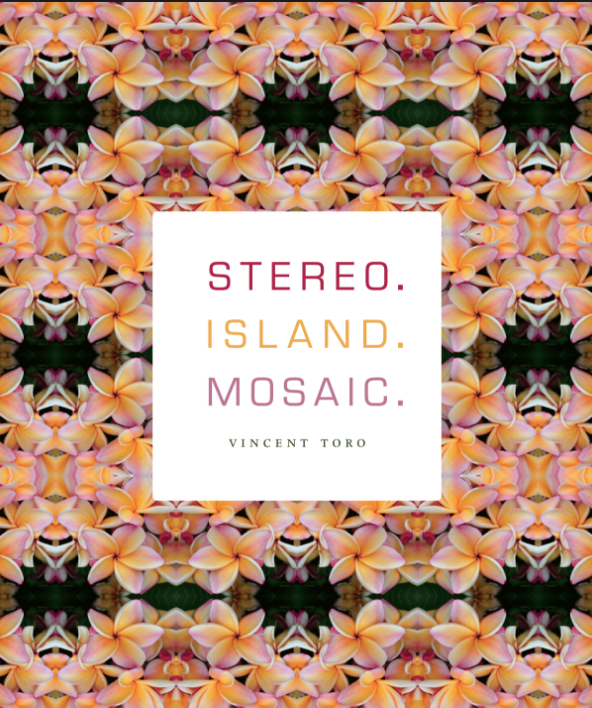ISSN: 1941-4137
POETRY THAT ENACTS THE ARTISTIC AND CREATIVE PURITY OF GLASS
POETRY THAT ENACTS THE ARTISTIC AND CREATIVE PURITY OF GLASS

Gabino Iglesias is a writer, journalist, and book reviewer living in Austin, TX. He’s the author of Zero Saints. His reviews have appeared in Electric Literature, The Rumpus, 3AM Magazine, Marginalia, The Collagist, Heavy Feather Review, Crimespree, The Brooklyn Rail, HorrorTalk, Vol. 1 Brooklyn, Criminal Element, and many other print and online venues. He is the book reviews editor at PANK Magazine and a columnist for LitReactor. You can find him on Twitter at @Gabino_Iglesias.
September 26, 2018
Edited by Stephanie Kaylor
Edited by Stephanie Kaylor
Review of Stereo. Island. Music. by Vincent Toro
 Stereo. Island. Music.
Vincent Toro
Ahsahta Press, 2016
Vincent Toro’s Stereo. Island. Mosaic. (Ahsahta Press, 2016) is a multilayered poetic text with a casing of beautiful language that hides a political core from which dream tendrils grow. From its opening pages, it points to imperialist/hegemonic forces that wish to “convert jibaros into assembly line products. To break in a horse. To potty train the landscape. To vaccinate. To anesthetize. To repackage population. To eradicate autonomy, force feeding a codependence on foreign economies through deletion of ecology and language.” He is talking about Puerto Rico here, a Caribbean island called a territory or a commonwealth, but that has been a colony since the Spaniards claimed it in 1492. However, the collection is also filled with themes like suffering, multiculturalism, and longing.
Undeniably political and with a heart full of pride, Stereo. Island. Mosaic. touches on Puerto Rican politics both past and present, but it also celebrates the island constantly. With a touch of bilingualism, mostly in the form of key words for music, places, clothes, and food, Toro manages to bring the island’s musicality to the forefront and dictates a multiplicity of rhythms by using space to force readers to go through each poem in the way he intended them to.
The poems in this book range from angry to funny, and Toro’s unique voice is present in all of them. Furthermore, he tackles Puerto Rican history in its entirety, beginning with a few titles, poems, and footnotes tied to taíno indians and going all the way to the Puerto Rican exile to the United States (mostly to New York), which is a modern staple of Puerto Rican culture that is still happening today:
Cast from the hillsides. Shipped as freight
from one isla to another.
Swiped like orphans from their mothers.
The promise of work hung like a bait.
La Guardia became the gate
offering you a safe return
once you’ve torn your tendons to earn
the fare back. Your plot is re-soiled.
Few will rise from out of the coiled
Snakes throat to reclaim their sunburns.
While mapping the links between the Puerto Rican mountains and the projects of New York City is a wonderful endeavor, and the job Toro does here deserves to be mentioned along with that of Puerto Rican/NYC poet extraordinaire Pedro Pietri, what pushes this collection into must-read territory is a combination of here/there poems and the remixes that appear throughout the text. The here/there poems show a person on the island first and then on the US mainland, highlighting the differences and showing the transformation the move forces on migrants with outstanding economy of language. On the other hand, the remixes are poems that are presented one way and then presented a different (or various different) way(s) by the exclusion/movement of some words. The result is an original that quickly morphs into something, shifting with it the focus of the poem, the themes that jump out at the reader, and becoming an entirely new text with a whole new context.
Ultimately, the brilliance of Stereo. Island. Mosaic resides in its ability to pull readers effortlessly through the experience of shifting culture. The poems are packed with signifiers that, more than pulled down in an attempt to control them, are invited to fly between cultures and experiences in order to explore how movement, geography, longing, and language forces them to constantly (re)define themselves.
As beautiful as it is complex, Stereo. Island. Mosaic is a collection of poems that easily bridge the gaps between historical complexity and cultural reaffirmation, between academic views of migration and the memories from el barrio, and between hybridity and the essence of a country that has been forced to adapt not only to new migration patterns but to different languages, influencing cultures, and changing economics. This is a book that will help readers understand Puerto Rico a tad more, and it accomplishes that through poetry. That in itself is commendable, and enough reason to make this required reading in the age of controversial borders, globalization, and migration based on socioeconomic nightmares.
Visit Ahsahta Press' Website
Stereo. Island. Music.
Vincent Toro
Ahsahta Press, 2016
Vincent Toro’s Stereo. Island. Mosaic. (Ahsahta Press, 2016) is a multilayered poetic text with a casing of beautiful language that hides a political core from which dream tendrils grow. From its opening pages, it points to imperialist/hegemonic forces that wish to “convert jibaros into assembly line products. To break in a horse. To potty train the landscape. To vaccinate. To anesthetize. To repackage population. To eradicate autonomy, force feeding a codependence on foreign economies through deletion of ecology and language.” He is talking about Puerto Rico here, a Caribbean island called a territory or a commonwealth, but that has been a colony since the Spaniards claimed it in 1492. However, the collection is also filled with themes like suffering, multiculturalism, and longing.
Undeniably political and with a heart full of pride, Stereo. Island. Mosaic. touches on Puerto Rican politics both past and present, but it also celebrates the island constantly. With a touch of bilingualism, mostly in the form of key words for music, places, clothes, and food, Toro manages to bring the island’s musicality to the forefront and dictates a multiplicity of rhythms by using space to force readers to go through each poem in the way he intended them to.
The poems in this book range from angry to funny, and Toro’s unique voice is present in all of them. Furthermore, he tackles Puerto Rican history in its entirety, beginning with a few titles, poems, and footnotes tied to taíno indians and going all the way to the Puerto Rican exile to the United States (mostly to New York), which is a modern staple of Puerto Rican culture that is still happening today:
Cast from the hillsides. Shipped as freight
from one isla to another.
Swiped like orphans from their mothers.
The promise of work hung like a bait.
La Guardia became the gate
offering you a safe return
once you’ve torn your tendons to earn
the fare back. Your plot is re-soiled.
Few will rise from out of the coiled
Snakes throat to reclaim their sunburns.
While mapping the links between the Puerto Rican mountains and the projects of New York City is a wonderful endeavor, and the job Toro does here deserves to be mentioned along with that of Puerto Rican/NYC poet extraordinaire Pedro Pietri, what pushes this collection into must-read territory is a combination of here/there poems and the remixes that appear throughout the text. The here/there poems show a person on the island first and then on the US mainland, highlighting the differences and showing the transformation the move forces on migrants with outstanding economy of language. On the other hand, the remixes are poems that are presented one way and then presented a different (or various different) way(s) by the exclusion/movement of some words. The result is an original that quickly morphs into something, shifting with it the focus of the poem, the themes that jump out at the reader, and becoming an entirely new text with a whole new context.
Ultimately, the brilliance of Stereo. Island. Mosaic resides in its ability to pull readers effortlessly through the experience of shifting culture. The poems are packed with signifiers that, more than pulled down in an attempt to control them, are invited to fly between cultures and experiences in order to explore how movement, geography, longing, and language forces them to constantly (re)define themselves.
As beautiful as it is complex, Stereo. Island. Mosaic is a collection of poems that easily bridge the gaps between historical complexity and cultural reaffirmation, between academic views of migration and the memories from el barrio, and between hybridity and the essence of a country that has been forced to adapt not only to new migration patterns but to different languages, influencing cultures, and changing economics. This is a book that will help readers understand Puerto Rico a tad more, and it accomplishes that through poetry. That in itself is commendable, and enough reason to make this required reading in the age of controversial borders, globalization, and migration based on socioeconomic nightmares.
Visit Ahsahta Press' Website
Glass: A Journal of Poetry is published monthly by Glass Poetry Press.
All contents © the author.
All contents © the author.





